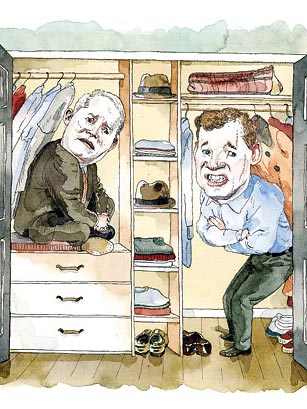
The Conservatives In the Closet
Hypocrisy is one of the most overused slurs in politics. People are called hypocrites when they're merely being inconsistent in their views or self-serving or human. But in 2006, the term fit two leading conservatives perfectly. In early October, the Mark Foley affair eclipsed all other news. The Congressman, 52, had behaved inappropriately with male teenage pages. While no one yet has claimed actual sex between Foley and a page, Foley had sent several of them creepy e-mails and creepier instant messages. Hypocrisy was at issue because he had possibly broken a recently passed law that criminalized the solicitation of sex online with anyone under 18. Who championed that law? None other than Mark Foley. "If I were one of these sickos, I'd be nervous," Foley had previously told John Walsh, star of America's Most Wanted. It was such a flagrant case of saying one thing and doing another that Foley had to go into rehab to protect himself from the media onslaught.
Five weeks later emerged another classic case of the damage of the homosexual closet: superpastor Ted Haggard, chairman of the National Association of Evangelicals, quit his post after Mike Jones, a male prostitute, claimed he was a longtime client. Haggard, 50, married with five kids, first said he'd only bought massages, but later confessed that Jones revealed "the deception and sensuality that was in my life." It seemed Haggard had also pulled a Foley: he had previously condemned gay adultery in the documentary Jesus Camp. In a word: hypocrisy. The word framed an election about a Republican coalition whose practices seemed seriously adrift from what it preached.